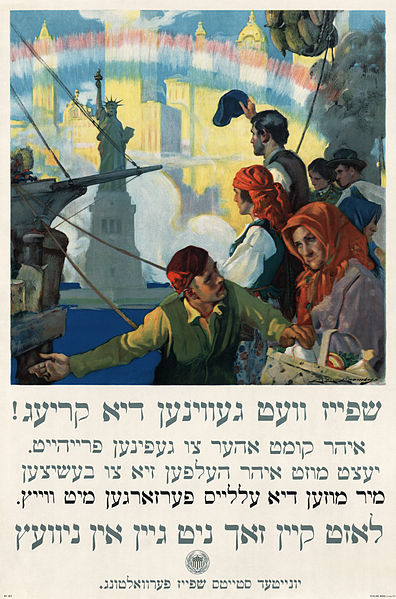
A few weeks ago, Dani Plung wrote a compelling piece here at New Voices about why she studies Yiddish. It is a remarkably fascinating way to connect with her past and rich cultural heritage. It is a unique way to explore her personal identity, both Jewish and not. Among the great wealth of Yiddish literature, she finds parallels to her own community. Yiddish enlarges her sense of belonging, transcending time and space.
However, I feel the need to warn that relying solely on this line of reasoning is dangerous. To be clear, I do not doubt Dani’s sincere motivations for learning Yiddish or her emotional attachment to the language and culture. As a Yiddishist myself, those have certainly proven to be powerful forces in my growing attachment and interest in the language and culture. But to emphasize personal connections to the language as the primary reason risks uncritical romanticizing and an eliding of the universal and humanistic messages found throughout yiddishkeit. It is these aspects, which Dani and I access through the Ashkenazi idiom, that I believe should stand as the most powerful appeal of Yiddish.
This particular belief is not original, however, but was laid out succinctly by one of the greatest Yiddish writers, Isaac Bashevis Singer. My Yiddish class at Columbia University recently listened to and read – in the original Yiddish – his 1978 banquet speech in Stockholm for the Nobel Prize for Literature. In his remarks, Singer answers the question that all Yiddishists constantly face, including Dani and me, which is “Why Yiddish?” In his typically humorous and playful manner, Singer replies “Why not Yiddish?” prompting hearty laughter from the audience. He continues, however, by actually answering the question and expounding on the linguistic richness of the language and its ability to speak to global human issues, regardless of the reader’s religion, language, race, or nationality. Singer ends his speech by reminding his audience that “Yiddish is the wise and humble language of us all, the idiom of frightened and hopeful humanity.”
A connection to family and ancestry is not to be undermined as a means to appreciate Yiddish (or Jewish) life and culture. But when that becomes the end goal, rather than the means to accessing some deeper meaning, the integrity of yiddishkeit suffers. And certainly, as the beleaguered Yiddishist often finds herself on the defensive, isn’t citing Singer’s reasoning a more powerful retort than referring to one’s fond memories of bubbe? This latter approach risks reducing Yiddish, and all its complexity and richness, to an actual bubbe-mayseh, or a minor thing – a grandmother’s tale.

What perhaps provoked my response, more than anything else, was when Dani admitted that Ashkenazi culture is no more inherently important or valuable than Sephardi cultures, but that Yiddish is hers and is thus a reason to explore it more deeply. There is nothing wrong with this on a personal level, and she is careful not to devalue other Jewish cultures. What upsets me most, though, is that by this logic alone, there is no reason for most American Jews (who are largely Ashkenazi) to study or explore Sephardic cultures – whose rapid assimilation, disappearance, and communal absence is undoubtedly more severe than even the most pessimistic Yiddishist can say about his own admittedly marginalized culture.
If concerned Jews are truly committed to a vision of klal yisrael, or Jewish unity, than we must both acknowledge and inform ourselves about all aspects of Jewishness, even if we don’t feel a particularly strong or immediate familial bond (although a report in Wired recently showed how almost all Ashkenazi Jews have some Sephardic ancestry). Just as a compassionate uncle, merely by virtue of being part of the same extended family, may support and comfort a distant cousin who is at risk, so too must the American Ashkenazi majority recognize and alleviate their ignorance of the wealth and richness of Sephardi culture. The imminent disappearance of native Ladino speakers – and the Sephardi culture embedded within – illustrates that opportunities for broader Jewish cultural awareness are rapidly (and silently) vanishing. This offhand eschewing of Sephardi cultures by a passionate Yiddishist (however sincere) is disheartening, especially since those in the Yiddish world are often more sympathetic towards and interested in Ladino and other Jewish languages and cultures than any other element of the American Jewish landscape.
If Yiddish can be valued as a universal language written in an Eastern-European Jewish idiom, we should no doubt be able to value Ladino or Judeo-Arabic in a similar way. As American Jews already familiar with a historical narrative colored by the Yiddish-speaking immigrants of the early 20th century, paying greater attention to the oft marginalized and forgotten Sephardi and Mizrahi communities can only serve to enrich our sense of Jewishness by exploring its rich diversity and modes of cultural and linguistic expression.
Max Daniel is the editor in chief of the Columbia Current.
